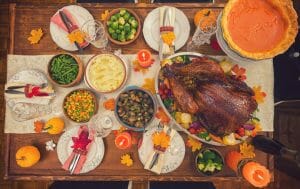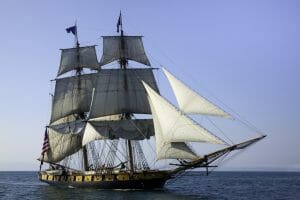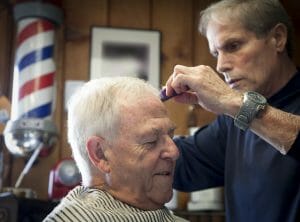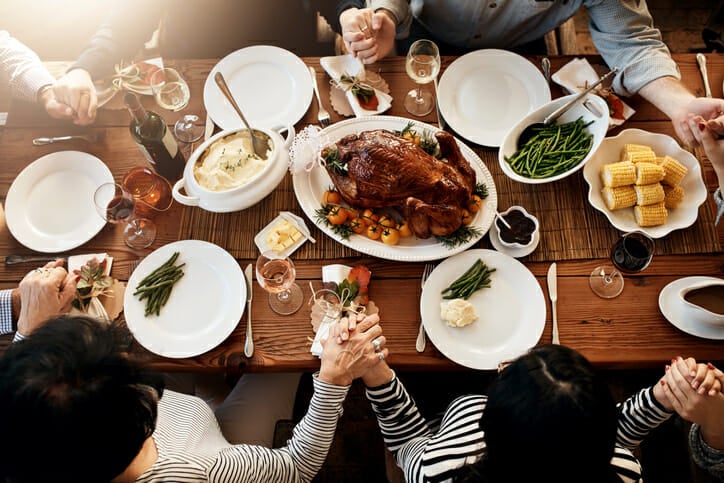Inspiration and Encouragement – November 2019 | Thanksgiving
Scripture Quote

A Merry Heart
A Blonde’s Thanksgiving: It was the first time the blonde was eating Thanksgiving dinner without her family. Trying to re-enact the tradition, she prepared a dinner for herself alone. The next day, her mother called to see how everything went.
“Oh, mother, I made myself a lovely dinner, but I had so much trouble trying to eat the turkey!” said the daughter.
“Did it not taste good?” her mother asked.
“I don’t know,” the blonde said. “It wouldn’t sit still!”
In All Things Give Thanks: A 4-year-old boy who was asked to return thanks before Christmas dinner. The family members bowed their heads in expectation. He began his prayer, thanking God for all his friends, naming them one by one. Then he thanked God for Mommy, Daddy, brother, sister, Grandma, Grandpa, and all his aunts and uncles. Then he began to thank God for the food. He gave thanks for the turkey, the dressing, the fruit salad, the cranberry sauce, the pies, the cakes, even the Cool Whip. Then he paused, and everyone waited and waited. After a long silence, the young fellow looked up at his mother and asked, “If I thank God for the broccoli, won’t he know that I’m lying?”
You’re IQ (inspirational quotes)
“May gratitude to God permeate my entire life.” – Charles Spurgeon
“You say, If I had a little more, I should be very satisfied. You make a mistake. If you are not content with what you have, you would not be satisfied if it were doubled.” – Charles Spurgeon
Fresh Manna
How the Pilgrims were Protected on their Ocean Voyage

The Pilgrims had comforted themselves by singing the Psalms, but this “noise” irritated one of the ship’s paid crewmembers. He told the Pilgrims he was looking forward to throwing some of their corpses overboard after they succumbed to the illnesses that were routine on such voyages. But as it turned out, this crewmember himself was the only person on the voyage to become sick and be thrown overboard. God providentially protected His people. A little-known fact about the Mayflower is that this ship normally carried a cargo of wine; and the wine spillage from previous voyages had soaked the beams, acting as a disinfectant to prevent the spread of disease.
During one terrible storm, the main beam of the mast cracked. Death was certain if this beam could not be repaired. At that moment, the whole Pilgrim adventure could very easily have ended on the bottom of the Atlantic. But, providentially, one of the Pilgrims had brought along a large iron screw for a printing press. That screw was used to repair the beam, saving the ship and all on board.
After sixty-six days at sea, land was sighted off what is now Cape Cod, Massachusetts. But that was not where the Pilgrims wanted to be. They had intended to establish their new colony in the northern parts of Virginia (which then extended to the Hudson River in modern-day New York), but two factors interrupted their plans. The winds had blown them off course, but they also learned that some other Englishmen who wanted to settle in the same northern part of Virginia had bribed the crew to land them somewhere else.
Once again God was in charge and the Pilgrims were right where God wanted them to be. Had they actually landed near the Hudson River; they would have most certainly been attacked by hostiles. Instead, there were none on Cape Cod when the Pilgrims made landfall there. When the Pilgrims landed in that region, the land had already been cleared and the fields had already been cultivated, but the Indians who had prepared the land had nearly all died of the plague a year or two earlier.
More than Conquerors
The Barber

“Why do you say that?” asked the customer.
“Well, you just have to go out in the street to realize that God doesn’t exist. Tell me, if God exists, would there be so many sick people? Would there be abandoned children? If God existed, there would be neither suffering nor pain. I can’t imagine loving a God who would allow all of these things.”
The customer thought for a moment, but didn’t respond because he didn’t want to start an argument. The barber finished his job and the customer left the shop. Just after he left the barbershop, he saw a man in the street with long, stringy, dirty hair and an untrimmed beard. He looked dirty and un-kept. The customer turned back and entered the barber shop again and he said to the barber: “You know what? Barbers do not exist.”
“How can you say that?” asked the surprised barber. “I am here, and I am a barber. And I just worked on you!”
“No!” the customer exclaimed. “Barbers don’t exist because if they did, there would be no people with dirty long hair and untrimmed beards, like that man outside.”
“Ah, but barbers DO exist! What happens is, people do not come to me.”
“Exactly!” affirmed the customer. “That’s the point! God, too, DOES exist! What happens is, people don’t go to Him.”
John 3:16 “For God so loved the world, that he gave his only begotten Son, that whosoever believeth in him should not perish, but have everlasting life.” Open your heart to Jesus today! Romans 10:13 “For whosoever shall call upon the name of the Lord shall be saved.” Do not delay reach out to Jesus now.
The Origin of Thanksgiving
The story of the Pilgrims begins in the early part of the 17th century. The Church of England under King James I was persecuting anyone and everyone who did not recognize its absolute civil and spiritual authority. Those who challenged ecclesiastical authority and those who believed strongly in freedom of worship were hunted down, imprisoned, and sometimes executed for their religious beliefs in 1600s England. A group of separatists first fled to Holland and established a community. After 11 years, about 40 of them agreed to make a perilous journey to the New World, where they would certainly face hardships, but at least the promise was, they “could live and worship God according to the dictates of their own consciences.” It’s a powerful belief, the belief in freedom of religion to engage in this kind of activity, to be able to cross an ocean to a place where you had no idea what to expect.
On Aug. 1, 1620, the Mayflower set sail. It carried a total of 102 passengers, including 40 Pilgrims led by William Bradford. On the journey, Bradford set up an agreement, a contract, that established “just and equal laws for all members of the new community, irrespective of their religious beliefs.” Where did the revolutionary ideas expressed in the Mayflower Compact come from? From the Bible. The Pilgrims were a people completely steeped in the lessons of the Old and New Testaments. They looked to the ancient Israelites for their example. And, because of the biblical precedents set forth in Scripture, they never doubted that their experiment would work. They were people with incredible faith. The journey to the New World was a long and arduous one. And when the Pilgrims landed in New England in November, they found, according to Bradford’s detailed journal, a cold, barren, desolate wilderness. There were no friends to greet them, he wrote. There were no houses to shelter them. There were no inns where they could refresh themselves. And the sacrifice they had made for freedom was just beginning.
During the first winter, half the Pilgrims, including Bradford’s own wife died of either starvation, sickness or exposure. When spring finally came, Indians, the Native Americans, indeed, “taught the settlers how to plant corn, fish for cod and skin beavers for coats. Life improved for the Pilgrims, but they did not yet prosper! This is important to understand because this is where modern American history lessons often end.” That’s where the traditional story of Thanksgiving ends: The Indians helped them and they learned how to plant corn, had they had a big feast, and that’s what we celebrate today. No! Thanksgiving is actually explained in most textbooks as a holiday for which the Pilgrims gave thanks to the Indians for saving their lives, rather than what it was. Thanksgiving was “a devout expression of gratitude” to God. If you doubt that, go look at George Washington’s first Thanksgiving Proclamation, when Thanksgiving became a national holiday because of George Washington.
The Pilgrims had merchant sponsors. They didn’t have the money to make this trip themselves. There were sponsors, merchants in Holland and London that paid for it. They had to be repaid. So, the contract that they had called for everything they produced to go into a common store, and each member of the community was entitled to one common share. “All of the land they cleared and the houses they built belonged to the community as well. It didn’t belong to any individuals, and everything they produced was to be distributed equally. Everyone would get the same, and
everybody would be the same.” All of the land they cleared and the houses they built belonged to the community as well. Nobody owned anything. They just had a share in it. It was a commune, folks. Bradford, who had become the new governor of the colony, recognized that this form of collectivism was as costly and destructive to the Pilgrims as that first harsh winter after settlement. He decided to take bold action. Bradford assigned a plot of land to each family to work and manage. Whatever they produced was theirs to do whatever they wanted – sell it, keep it, use it, but it was theirs. Well, you know what happened. This was, in effect, the unleashing of the power of competition and the marketplace. The Pilgrims had discovered and experimented with what could only be described as socialism, and it failed miserably.
It didn’t work! Drastic action taken by William Bradford got rid of it. What Bradford and his community found was that the most creative and industrious people had no incentive to work any harder than anyone else, because no matter what you produced, you got the same as anybody else. What Bradford wrote about this social experiment should be in every schoolchild’s history lesson: “The experience that we had in this common course and condition tried sundry years … that by taking away property, and bringing community into a common wealth, would make them happy and flourishing – as if they were wiser than God.”
“For this community [so far as it was] was found to breed much confusion and discontent, and retard much employment that would have been to their benefit and comfort,” he continued. “For young men that were most able and fit for labor and service did repine that they should spend their time and strength to work for other men’s wives and children without any recompense…”
That’s from his own journal. The Pilgrims found that people could not be expected to do their best work without incentive. So, what did Bradford’s community try next? They unharnessed the power of good old free enterprise. They let every family have its own plot of land to work and they were permitted to market the products, the crops that they grew.
Bradford wrote, “This had very good success. For it made all hands industrious, so as much more corn was planted than otherwise would have been.” In other words, there was capitalism going on. There was buying and selling going on. There were profits. A group of people arrives on a boat committed to being equal and the same. It fails. They end up turning out industrious activity, creating that by virtue of competition and being able to keep what you produced. They produced more than they needed. They ended up setting up trading posts. They exchanged goods with the Indians, and the profits finally allowed them to pay off the debts to the sponsors, the merchants in London who had sponsored them.
Thus, the success and prosperity of the Plymouth settlement attracted more Europeans and began what came to be known as the “Great Puritan Migration.” In other words, the Pilgrims had such overwhelming success at growing their community, word spread all the way back to England, and it began this humongous migration of people.
Remember, the Pilgrims preceded the founding of the country by hundreds of years. They really were the ones that got it started and showed how it could be done. And it was – I don’t want to use the word “rich.” It was so plentiful; this was what they were thankful for. They thanked God for the guidance found in the Bible for restructuring their community, and shared their bounty with the Indians, who did teach them how to do things they didn’t know how to do, basically be farmers.
And that’s “The True Story of Thanksgiving.”



